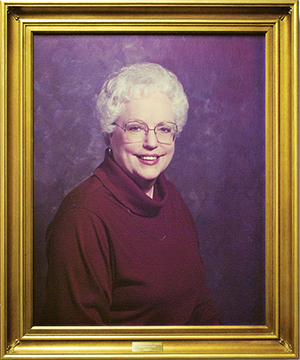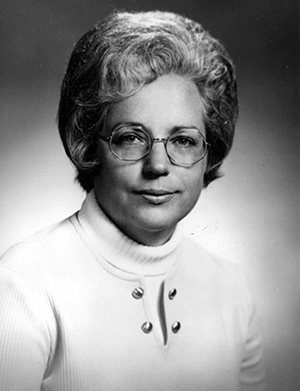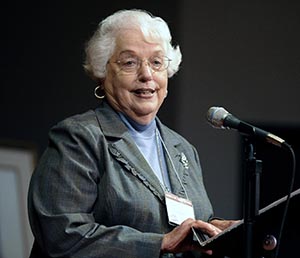By Bob Allen
A memorial service for Carolyn Weatherford Crumpler — former head of the Southern Baptist Convention Woman’s Missionary Union and an early champion of the Cooperative Baptist Fellowship who died Jan. 2 after a long illness — is scheduled for Saturday, Jan. 24, at Mount Carmel Baptist Church in Cincinnati.
The service is scheduled to begin at 11 a.m., following visitation from 9:30 to 10:30 a.m., also at the church. Visitation at the church will also take place from 4:30 p.m. to 7:30 p.m. on Friday, Jan. 23, according to a news release.
 CBF Executive Coordinator Suzii Paynter described Crumpler — who helped found the Fellowship in 1991 and served as CBF moderator in 1995-1996 — as a hero in Baptist life.
CBF Executive Coordinator Suzii Paynter described Crumpler — who helped found the Fellowship in 1991 and served as CBF moderator in 1995-1996 — as a hero in Baptist life.
“Carolyn was a trailblazer for the Cooperative Baptist Fellowship and for all of us in Baptist life,” Paynter said. “Her support for Baptist distinctives, women in all positions of ministry and the men and women who were called to spread God’s love in places near and far is legendary.”
Crumpler, 84, grew up as the middle child of three in Frostproof, Fla. Her father was a citrus grower. She was active in First Baptist Church there, directing the adult choir and serving as an elected leader in her local association while in the 11th grade.
After high school she went to Florida State University, where she changed her major every quarter before finally settling on library science. She worked five years as a high school librarian and was active in her church, but felt unfulfilled in her childhood calling to be a missionary.
Not theology, not music, so …
She enrolled in New Orleans Baptist Theological Seminary. She wanted to study theology, but at the time women could not enroll in the School of Theology. She was not a musician, so she had no desire to enroll in the School of Church Music, so that left her with the School of Religious Education, even though she did not feel it was what she needed.
She took all her electives in theology, except for homiletics — or preaching — which later in life she said “really would have helped me a great deal, since as it turned out I spent most of my life preaching.”
After graduating she reluctantly accepted a job as first young woman’s association director for Alabama WMU. After three years she moved to Florida, where she directed the state WMU’s Girls Auxiliary program.
While there she learned about a medical problem — hypertension — that ended her dream of becoming a missionary, and afterward poured her energy into promoting missions through WMU, a women’s auxiliary to the Southern Baptist Convention founded in 1888.
Crumpler served as director of the state WMU in Alabama and then in Florida before succeeding Alma Hunt as executive director of the national WMU organization, based in Birmingham, Ala., in 1974.
Growing controversy
Except for occasional criticism for holding mixed-races meetings of black and white women, Crumpler avoided major controversy in her early years with WMU. That changed with the arrival of the women’s liberation movement. She recalled one meeting while she was still in Florida with some younger women discussing the topic of ordination.
 She dismissed the notion by saying that she wasn’t concerned about being ordained because she didn’t think any man wanted to take her job. One of the young women looked her in the eye and said: “But we are deeply concerned, Miss Weatherford, and you are our leader. You have to care.”
She dismissed the notion by saying that she wasn’t concerned about being ordained because she didn’t think any man wanted to take her job. One of the young women looked her in the eye and said: “But we are deeply concerned, Miss Weatherford, and you are our leader. You have to care.”
In her first press conference as the national WMU director, several questions from the media were about her views on women’s ordination. She responded to one question describing herself not as a “feminist” but a “humanist,” meaning she supported both men and women but taken by critics as a reference to “secular humanism,” the current evil-of-the-day for many conservative Christians.
A couple of years later she landed in hot water again, when the media picked up a brief but disparaging comment she made at a state WMU meeting about The Total Woman, a bestselling book in 1974 written as a conservative Christian rebuttal of feminism that advised wives on how to keep their husbands happy with suggestions including meeting him at the door with their bodies wrapped in Saran Wrap.
Speaking boldly
Crumpler later revealed that the negative reactions really hurt, but she learned from the experience that she would be criticized if she continued to speak boldly. “And I knew that I would continue to speak boldly,” she wrote in the Summer 2014 edition of Christian Ethics Today. “I would continue to be a target.”
Early in her WMU leadership Crumpler — then known as Carolyn Weatherford — said she didn’t consider herself a “bra-burning feminist,” but admitted that “the more I talk the more feminist I sound.”
“I’m as liberated as I want to be,” she said in a seminar on women in the church in 1976, “but I think many churchwomen want to be freer than they are.”
She warned of an “anti-women mindset” that provided few career opportunities for women in the Southern Baptist Convention except in the traditional area of WMU. She called for increased representation of women on denominational governing boards. She also supported the idea of women serving as church planters. She visited missionaries in nearly 100 countries, and found it ironic that women were preaching the gospel virtually everywhere except within the SBC.
Crumpler was the only female member of the Interagency Council of the SBC, an organization of agency heads that no longer exists. In 1978 the group decided to sponsor a “Consultation on Women in Church-Related Vocations.” She recommended calling it a convocation of “women in ministry,” but most of the men considered that a bad idea.
In 1982, as WMU celebrated its 75th anniversary, Crumpler said it became evident that more needed to done to provide support for women. The following year a group met in Louisville, Ky., to lay groundwork for a new organization today called Baptist Women in Ministry.
Royal wedding
While working at WMU, Carolyn Weatherford was fond of saying, “I’m not married … yet.” It turned out she wasn’t completely joking. She retired from WMU in 1989 at 59 to marry Joe Crumpler, a Southern Baptist pastor in Ohio and widower whose first wife died seven years earlier. They dated for five years, a courtship that so enamored leaders in the denomination that their long-anticipated announcement was nicknamed the “royal wedding.”
 Another life-changing event occurred in 1990, when Daniel Vestal, a moderate candidate for SBC president, convinced Crumpler to run for first vice president, an office to which she was nominated but not elected the year before. Their defeat essentially wrapped up a decade-long battle between conservatives and moderates for control of the nation’s second-largest faith group behind Roman Catholics.
Another life-changing event occurred in 1990, when Daniel Vestal, a moderate candidate for SBC president, convinced Crumpler to run for first vice president, an office to which she was nominated but not elected the year before. Their defeat essentially wrapped up a decade-long battle between conservatives and moderates for control of the nation’s second-largest faith group behind Roman Catholics.
Both she and Vestal were key leaders in formation of the Cooperative Baptist Fellowship, a new group formed to uphold principles devalued during the “conservative resurgence” including women serving in pastoral roles.
Crumpler said she intended to continue to support WMU after her retirement, in ways such as writing for denominational publications, but she was “obliterated” from SBC life because of her involvement with CBF.
She is also credited with aiding the launch of several CBF partner ministries. She served on the founding board of the Baptist Center for Ethics, started in 1991 as an alternative to what is today known as the SBC Ethics and Religious Liberty Commission.
She also was a founder of Global Women, a group formed in 2001 to improve the lives of women worldwide and to nurture, encourage and support women called into service as missionaries.
John Pierce, executive editor of Baptists Today since 2000, said at first he was hesitant to take the job, but Crumpler’s encouragement as a member of the newspaper’s board of directors helped persuade him to change his mind.
Her leadership in WMU earned her a seat on the general council of the Baptist World Alliance representing the SBC, a BWA founder and the largest member body until it withdrew from the global network in 2004. She served 28 years on the American Bible Society board of trustees.
Changed relationships
Crumpler long considered fellow SBC agency heads some of her closest friends, but growing disagreement over the role of women in Baptist life during the 1980s increasingly made her a lightning rod for controversy.
She told several stories of being invited to speak at meetings and following a preacher who had just issued a harsh rebuke of females in the pulpit. Unfazed, she won back the audience with a witty comeback remark to ease the tension, and then proceeded with her message as planned.
In 1987 Crumpler accepted the Distinguished Service Award from the SBC Christian Life Commission, despite opposition by conservative trustees. Two new directors who opposed her said they had never heard of Carolyn Weatherford. Another trustee said he knew who she was, and he didn’t like her.
Crumpler said the thing that probably brought the most criticism was neither women’s ordination nor race relations, but when she met with Pope John Paul II during a papal visit to the United States in 1987.
One pastor assured her in a letter than if she thought it would be an opportunity to “convert” the pontiff that there were many male preachers better equipped to do it. Her favorite letter, she recalled in Carl Kell’s Exiled: Voices of the Southern Baptist Convention Holy War, came from a pastor in South Carolina who said: “Dear Carolyn Weatherford, in the last 10 years you have did many things that made me say ‘Oh, no!’ But this time you have outdid yourself.”
“I loved that one!” she commented.
Previous story:
